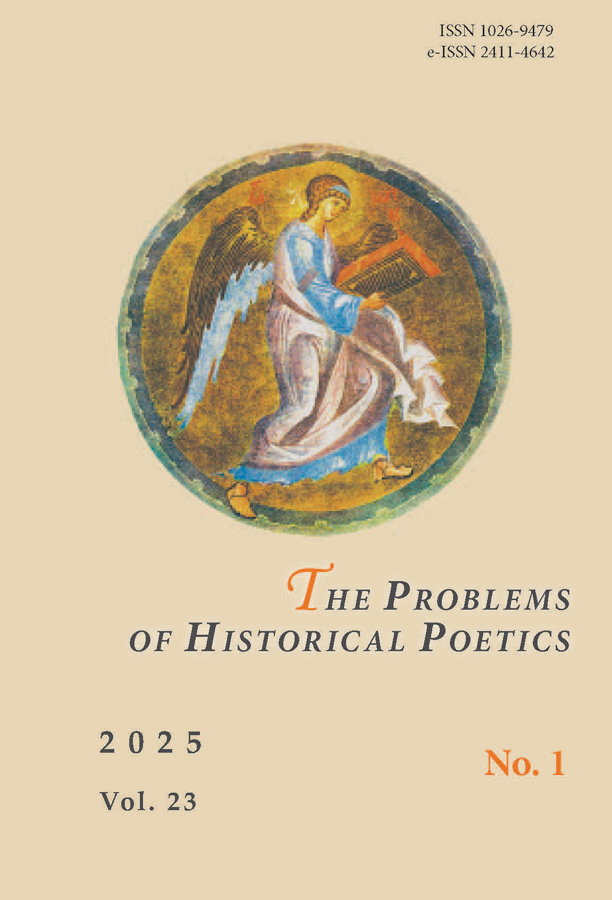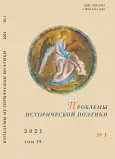The Sense-Generating Role of Biblical Text in Lydia Nelidova’s Story Polosa
- Authors: Golovko V.M.1
-
Affiliations:
- North-Caucasus Federal University
- Issue: Vol 19, No 1 (2021)
- Pages: 283-307
- Section: Articles
- URL: https://bakhtiniada.ru/1026-9479/article/view/285301
- DOI: https://doi.org/10.15393/j9.art.2021.9083
- ID: 285301
Cite item
Full Text
Abstract
The article analyzes the semantic functions of the Old Testament and New Testament texts in the story Polosa (Stripe), a landmark for the literature of the final stage of Russian classical realism, written by Lydia Nelidova, whose work has not yet been the subject of special study. The relevance of the research is defined by the rather high role of Nelidova’s creative activity in the literary process of the last decades of the 19th century. Biblical references, quotations, reminiscences, allusions and paraphrases, which determine the sequence of the text that creates the semantic field of the work, perform the dominant ideological and aesthetic function in creating the story as a “non-trivial new text.” Nelidova’s innovation is based on the active use of Dostoevsky’s literary traditions (orientation toward the idea of “finding a person in a person” and the “living life” constant). As a “semantic whole,” Nelidova’s story is organized by the internal dialogue of three concepts of “life.” One of them is based on the Christian teaching, the other on an appeal to science, and the third — on the idea of life as an all-dominating objective force. The author’s moral and aesthetic position, which confirms the biblical concept of life, is objectified in the logic of semantic actualization of the gospel truths associated with the interpretations of the eternal theme of the struggle between good and evil, ways of human salvation, overcoming the sin of thoughts, pride and selfishness. The artistic historicism of the story, manifested in the coverage of the social contradictions of the post-reform Russia, sanctions the author’s intentionality associated with the assertion of universal human spiritual, moral and humanistic ideals. Formation of meaning at the level of the author’s intentionality and at the level of meaning generation is carried out by activating the intertextual, hypertextual and contextual functionality of biblical pretexts and traditions of Orthodox Christian culture. It is implemented in the process of illuminating conflicts of time and characters’ psychological disclosure. Intertextual reminiscences and quotes from biblical texts, the works of Christian ascetic writers and patristic sources aim to form the semantic core of the main character’s narrative and implement the principle of intersemantization of meanings enshrined in sacred texts. Thanks to these texts, they manifest in the thoughts of a character seeking a way out of spiritual and moral impasse. The author’s artistic experience stimulated the formation of the Dostoevsky school in the literature of the last decades of the 19th century. The author’s quote-based thinking anticipates the narrative strategies that will become characteristic of the artistic discourse of subsequent historical and literary eras.
About the authors
Vyacheslav M. Golovko
North-Caucasus Federal University
Author for correspondence.
Email: vmgolovko@mail.ru
ORCID iD: 0000-0001-5244-8972
PhD (Philology), Professor of the Department of National and World Literature
Russian Federation, StavropolReferences
- Abasheva M. P. New Strategies for Writing and Reading in the Era of Social Networks. In: Filologicheskiy klass [Philological Class], 2018, no. 2 (52),
- pp. 43–48. (In Russ.)
- Alefirenko N. F., Nurtazina M. P. Metaphorical Discourse: in Search for the Essence of Speech Imagery. In: Cuadernos de Rusística Española, 2018, vol. 14, pp. 49–65. (In Russ.)
- Bakhtin M. M. Estetika slovesnogo tvorchestva [Aesthetics of Verbal Creation]. Moscow, Iskusstvo Publ., 1986. 445 p. (In Russ.)
- Veselovskiy A. N. Istoricheskaya poetika [Historical Poetics]. Moscow, Vysshaya shkola Publ., 1989. 404 p. (In Russ.)
- Vinogradov V. V. Turgenev and the School of Young Dostoevsky (Late 40s of the 19th Century). In: Russkaya literatura, 1959, no. 2, pp. 45–71. (In Russ.)
- Zen’kovskiy V. V. Istoriya russkoy filosofii: v 2 tomakh [History of Russian Philosophy: in 2 Vols]. Rostov-on-Don, Feniks Publ., 1999, vol. 1. 544 p. (In Russ.)
- Lotman Yu. M. Semiosfera [Semiosphere]. St. Petersburg, Iskusstvo-SPB Publ., 2000. 704 p. (In Russ.)
- Morozkina E. A., Biktimirova M. M., Iskhakova E. V. Biblical Metaphor in Literary Text. In: Vestnik Bashkirskogo universiteta [Bulletin of Bashkir University], 2018, vol. 23, no. 2, pp. 538–541. (In Russ.)
- Pruvôt G., Sedykh A. P., Buzinova L. M. Text, Context, Intertext: Synthesis of Meaning. In: Nauchnyy rezul’tat. Voprosy teoreticheskoy i prikladnoy lingvistiki [Scientific Result. Questions of Theoretical and Applied Linguistics], 2018, vol. 4, no. 3, pp. 21–35. (In Russ.)
- Semanova M. L. L. F. Nelidova About Sleptsov. In: Vasiliy Sleptsov: Neizvestnye stranitsy [Vasily Sleptsov: Unknown Pages]. Moscow, Academy of Sciences of the USSR Publ., 1963, pp. 488–494. (Ser. “Literary Heritage”; vol. 71). (In Russ.)
- Skurat K. E. Velikie uchitelya tserkvi [Great Teachers of the Church]. Available at: https://www.eparhia-saratov.ru/Content/Books/72/tutors.pdf (accessed on August 10, 2020) (In Russ.)
Supplementary files











